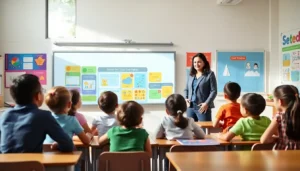Elementary education is like the foundation of a skyscraper; without it, everything else comes tumbling down. It’s the magical realm where kids transform from curious toddlers into budding scholars, armed with the skills they need to tackle the world. Picture a classroom buzzing with energy, where crayons are mightier than swords, and every question is a potential adventure.
In this vibrant stage of learning, kids dive into reading, math, and science, often while trying to avoid the dreaded broccoli on their lunch plates. But it’s not just about academics; it’s where friendships blossom and creativity takes flight. Understanding the importance of elementary education is crucial for shaping future generations. So buckle up as we explore the ins and outs of this essential phase, and discover why investing in elementary education is one of the smartest moves a society can make.
Table of Contents
ToggleOverview of Elementary Education
Elementary education serves as the cornerstone of academic and social development for children aged five to eleven. This stage focuses on developing basic skills in crucial subjects such as reading, writing, math, and science. Engaging teaching strategies help students grasp foundational concepts effectively.
Classrooms in elementary education nurture curiosity and creativity, offering a variety of activities that promote interactive learning. Students participate in group projects, experiments, and discussions, fostering collaboration and communication skills. Teachers play a vital role in creating a supportive environment, guiding students as they explore new ideas.
Investment in elementary education yields significant long-term benefits for individuals and society. Studies indicate that early academic achievement correlates with higher graduation rates and greater career success. Furthermore, social-emotional learning during these formative years equips children with necessary interpersonal skills, helping them build healthy relationships.
Curriculum design varies across districts, allowing for flexibility in teaching methods. Many schools incorporate technology into lessons, preparing students for a digital future. Regular assessments help monitor progress, ensuring that educators can address individual learning needs promptly.
The importance of parental involvement cannot be overstated. Parents and guardians contribute significantly to their child’s educational journey, reinforcing learning at home. Open communication between schools and families strengthens this partnership, enhancing student outcomes.
Understanding the value of elementary education enables communities to prioritize funding and resources, driving continuous improvements in teaching quality and educational access. Supportive policies and programs further enhance the positive impact of this fundamental stage in children’s lives.
Importance of Elementary Education
Elementary education plays a crucial role in laying the groundwork for lifelong learning. This foundational stage shapes children’s academic and personal growth significantly.
Cognitive Development
Cognitive development in elementary education focuses on enhancing children’s intellectual abilities. Engaging activities like hands-on experiments and collaborative projects stimulate critical thinking. Students develop fundamental skills in reading, writing, and mathematics during this crucial period. Research shows that early academic achievements lead to improved performance in later grades. Understanding concepts at this age aids in problem-solving and analytical skills. Surrounded by supportive environments, children gain confidence in their abilities. This period of exploration ultimately sets the stage for advanced learning.
Social Skills Development
Social skills development is vital in elementary education, promoting effective communication and teamwork. Classroom interactions encourage children to form friendships and resolve conflicts constructively. Participating in group activities enhances cooperation and empathy towards peers. The social-emotional learning components foster emotional resilience and adaptability. Students learn to express their feelings and understand diverse perspectives. Engaging with different personalities prepares them for future social contexts. Strong social skills lead to better collaboration in academic and extracurricular settings. This foundation of interpersonal skills supports children’s growth into capable adults.
Curriculum Framework
The curriculum framework in elementary education outlines essential learning experiences for children. This structure supports academic and personal growth during formative years.
Core Subjects
Core subjects in elementary education focus on foundational skills vital for future learning. Reading, math, and science remain primary areas of instruction. Language arts classes develop literacy and comprehension, while math emphasizes problem-solving and numerical understanding. Science engages students in exploration and inquiry-based learning. Social studies connect students to history and culture, fostering awareness of different perspectives. Teachers tailor lessons to meet diverse learning needs, ensuring all students grasp key concepts.
Extracurricular Activities
Extracurricular activities play a significant role in holistic development for elementary students. Activities such as sports, music, and arts enhance physical skills and creativity. Participation in team sports promotes teamwork and discipline, while music and arts encourage self-expression. Clubs and after-school programs build leadership skills and provide opportunities for social interaction. Engaging in these activities enriches the educational experience, allowing children to discover new interests and talents. Schools often prioritize these programs to support well-rounded development in students.
Teaching Methodologies
Teaching methodologies in elementary education encompass a variety of strategies that facilitate student learning. Effective methods help cultivate essential skills in young learners while promoting engagement and curiosity.
Traditional vs. Modern Approaches
Traditional approaches often rely on direct instruction and structured curricula. Teachers utilize lectures and standardized assessments to convey knowledge. In contrast, modern approaches emphasize student-centered learning. These methodologies encourage collaboration and critical thinking through interactive activities and problem-based learning. Project-based assignments and inquiry-based learning allow students to explore subjects actively. Evidence shows students in modern classrooms demonstrate greater motivation and retention of information.
Technology Integration
Technology integration plays a pivotal role in contemporary elementary education. Digital tools, such as tablets and computers, enhance traditional learning experiences. Educators incorporate educational software and online resources to enrich lessons. Interactive platforms promote engagement and cater to diverse learning styles. Data indicates that utilizing technology can improve academic achievement and foster skills in digital literacy. By integrating technology, teachers create dynamic environments that prepare students for a tech-driven world.
Challenges in Elementary Education
Elementary education faces several significant challenges that impact its effectiveness. Addressing these challenges is vital for enhancing student outcomes.
Funding and Resources
Funding and resources play critical roles in the quality of elementary education. Schools often rely on local taxes, which leads to disparities between affluent and disadvantaged districts. Budget constraints limit access to essential materials, technology, and extracurricular activities. Data indicates that underfunded schools struggle to provide adequate support for students, hindering their academic growth. Essential programs for art, music, and physical education often receive cuts, impacting students’ holistic development. Equity in funding ensures that all children have access to high-quality educational experiences, fostering a more balanced learning environment.
Teacher Training and Support
Teacher training and support significantly influence the quality of education. Many teachers enter the profession without adequate preparation or ongoing professional development opportunities. Effective training focuses on contemporary instructional strategies and classroom management techniques. Ongoing support enhances teachers’ abilities to address diverse learning needs and adapt to changing educational environments. Research shows that well-supported teachers often create more engaging and effective classrooms. Prioritizing comprehensive training programs ensures educators feel confident and capable, ultimately improving student outcomes in elementary education.
Conclusion
Elementary education lays the groundwork for lifelong learning and personal development. By fostering essential skills and social-emotional growth, it prepares children not just for academic success but for meaningful relationships and future challenges. Investing in this crucial stage benefits individuals and communities alike, creating a ripple effect that enhances overall societal well-being.
As schools face challenges like funding disparities and resource limitations, it’s vital for stakeholders to advocate for better support and training for educators. Prioritizing elementary education ensures that every child has the opportunity to thrive. This commitment not only shapes capable individuals but also strengthens the fabric of society, paving the way for a brighter future.












